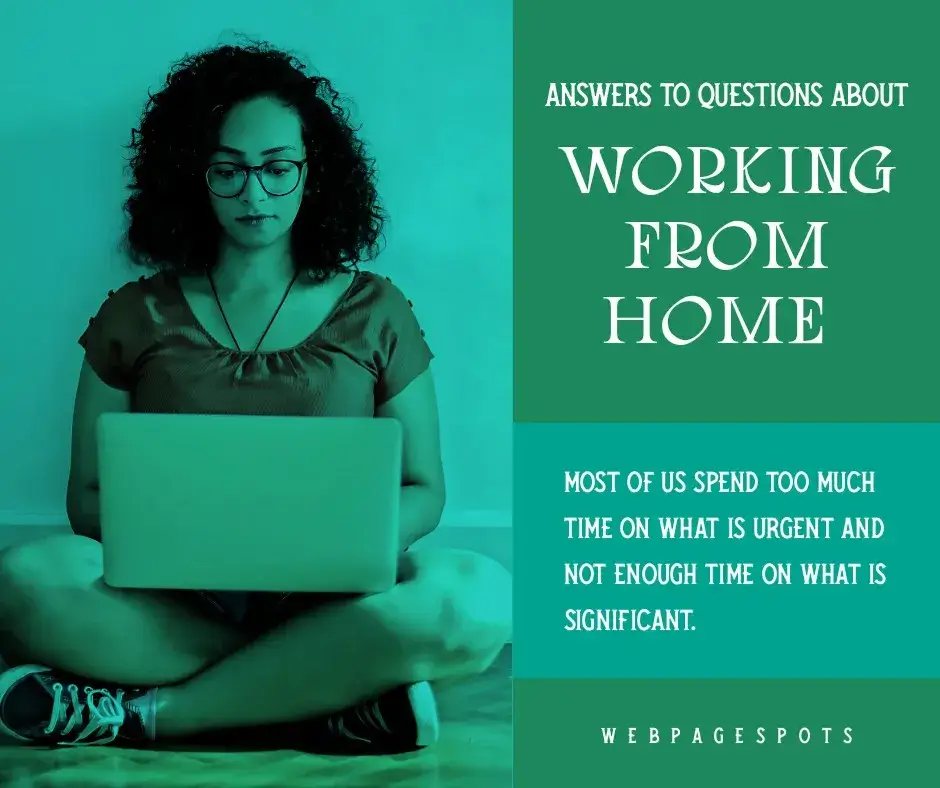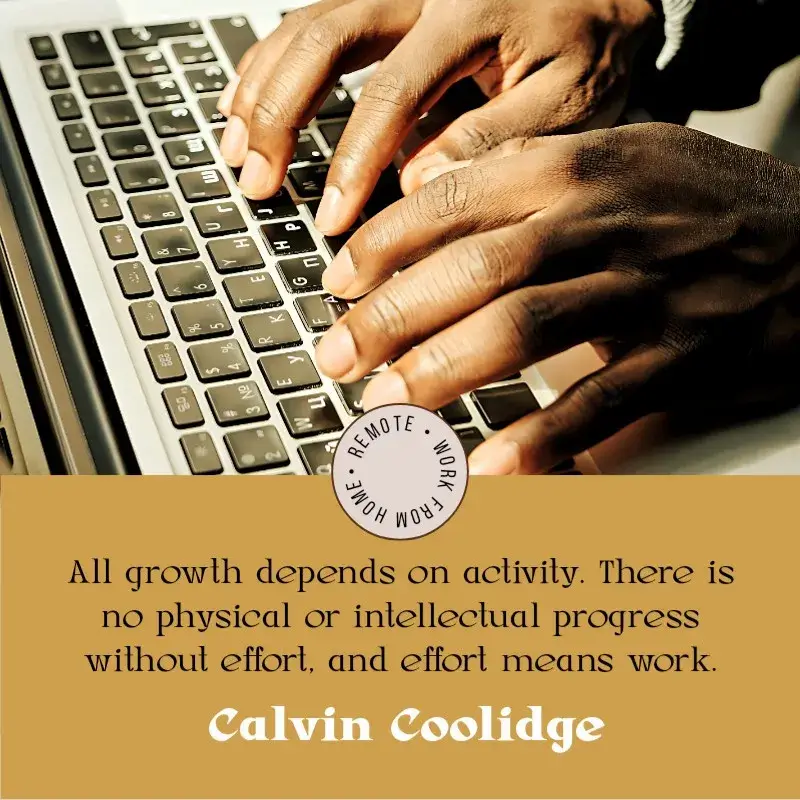Working from home: 19 perfect answers to optimize your experience
This blog post may contain affiliate links. If we find a product or service to be useful, we encourage you to visit the website via that link. If you make a purchase through our referral link, we may receive a commission. Rest assured, you will not be charged any additional fees. By using these links, you can support us while making your purchase. For more information visit here.
Definition of work from home!
Work from home (WFH) is a flexible work arrangement in which employees perform their job responsibilities remotely, usually from home or in a location outside of their regular office.
This arrangement allows employees to avoid commuting long distances and saves time and resources—true for both the employee and the employer.
WFH has grown in popularity in recent years, particularly with the advancement of technology and internet access. People widely use it in response to global events like the COVID-19 pandemic. What do you think? Will it continue forever?
Answers to 19 big questions that can make you succeed in “working from home”
If you want to find work-from-home opportunities, you may need the right technology, devotion, and workspace. But success may take some effort and time.
- Set an alarm
- Get up and move around often.
- Dress like you are heading to work
- Keep regular working hours.
- Have a dedicated workspace.
- Get exercise regularly.
- Use the right communication tools.
- Plan your breaks, meals, and activities.
- Separate your work environment from your living environment.
- Reward yourself for a job well done.
- Avoid multitasking at all costs.
Many individuals consider the ability to work from anywhere on their own schedule to be the ultimate dream. Working from home can be dreadful at first, especially if you’re used to being in an office with people around, but not anymore!
There are a lot of things you need to know before jumping straight into a full-time or part-time remote position.
Therefore, here’s a list of 19 key points that will help make your transition to operating remotely much smoother. Working from home is a challenge, but with the proper knowledge and attitude, you can get the job done just as effectively as you would in an office!
There are certain things you need to know in order for it to work. Now let’s continue answering 19 silly questions and concerns.

1. Is working from home the easiest way to earn extra money?
Every day, you hear people talking about the great opportunities they’ve found on the internet—making money online. It all depends on how involved you want to be. Working from home is one of the easiest ways to make extra money. There are many companies and programs that will give you the opportunity to work from home. Being in the comfort of your own home is a major benefit.
Some companies have created work-from-home programs for customer service jobs that don’t require people to be in the office every day—from home, they do a variety of tasks. When it comes right down to it, there are many ways that you can make extra money working from home.
One way to get out of whatever you’re currently doing is to do something else instead. Working from home can be very rewarding if you have the right tools and equipment. It’s also a lot easier than walking out for a job interview, which can be stressful and time-consuming.
There are millions of people who want to make extra money online, but most of them don’t know how. They think that blogging or selling e-books is all they need to do. But if you want to make money from home, you need more than just a few ideas. It takes a lot more effort to work from home than just searching on Google or reading an article about how to do so.
2. Does working from home really equate to guilt-free work?
You can be productive and get things done without the pressure of being in an office. It means you have more control over your time—you can work on your own schedule whenever necessary.
You sit at home and surf the web, watch TV, stream movies, or listen to music. For more relaxation, you can stay in your slumber suit until you tire of it and then put on something else.
Most people love working from home because they don’t want to stick in an office environment or deal with other people all day long. Working from home allows you to set your own hours and take breaks whenever you need them.
Working from home also means you don’t have to worry about traffic or weather impeding your commute or falling behind someone who is late for work.
If you work during the day, you can easily choose whether to work in the morning or later in the evening, ensuring that you get more time off during the week and on weekends!
Working from home definitely has its perks! The best part is that you can focus on work while not feeling terrible about missing work. When it comes to taking time off or working from home, many employees feel guilty about being in the house—what their neighbors will think. But with remote work, you can do your job from the comfort of your own home while remaining productive!
3. Who can work from home?
People can work from home, whether they are freelancers, remote workers, online entrepreneurs, households, or business owners. It’s intuitive and liberating to work from home since people can set their own schedules and hourly rates. Yet, it’s worth stating: most positions still involve some on-site work.
Why do people want to work from home? There are reasons. Some like the flexibility of working from home, while others may need to get away from the hustle and bustle of their normal day jobs.
Whether it’s because your kids are in school or simply because you have a busy schedule, working from home can be a convenient way to earn extra money. Not only can you make more money when you’re not at work, but you also won’t have to worry about traffic or crowds—you save on transportation costs.
Anyone with the will and determination to work hard can work from home, no matter what their age or time constraints. After all, there are many ways for people in any profession to make a buck.
Often, newbies who don’t know raise questions about where to begin and what they should be doing. The good news is that there’s no shortage of companies that offer remote jobs that allow you to work from home or anywhere else you wish.
4. What is the future of working from home?
Working from home has a promising future! You will not only can work smarter, but you will also make a higher salary and reap the rewards of being your own boss.
In contrast, working from home is a popular way for business owners to cut down on their office expenses. For salaried people who prefer to work from home during their free time, this can also be a viable option.
Working from home is becoming more and more attractive.
For a variety of reasons, people are leaving their jobs for the lucrative world of ‘work from home’—saving on high living costs and long commutes. They are now working from home, reducing their expenses, and earning extra money that is equal to their regular job earnings.
There seems to be no doubt that working from home will continue to boom in the future, as it has done so far. But some basic changes are necessary before it can truly take off and be effective.
5. Will working from home continue in 2025 and beyond?
It is difficult to predict the future, but it is likely that many people will continue to work from home in 2025 and beyond.
The COVID pandemic has shown us that there are many advantages to working from home, such as increased flexibility, reduced costs, and improved work-life balance for employees.
As more businesses and organizations find effective ways to make remote work successful, it’s likely that the trend of hiring and then getting work done from home will continue.
Many companies have implemented work-from-home policies since the pandemic outbreak, and based on current facts, this is likely to continue in the future.
Many individuals discover they prefer working from home to sitting in an office. This means that working from home will continue to be a popular option in the years to come.
However, it remains uncertain whether this practice will persist in the long term. There are two sides to this.
Some claim that working from home is a must for modern professionals since it gives them more flexibility and a better work-life balance. Others claim that working from home is solitary and distracting.
6. When will the craze of working from home end?
I do not have an answer to this question; however, I believe that many companies will give their staff the right to work from their living room. Others can also show generosity when they see them.
However, this depends on the industry, the size of the company, and the comfort level of the employees. It’s likely that the future of working from home will depend on the individual needs of each company, its employees, or the circumstances.
Thanks to working from home, companies are now more productive and compete on a global scale. Therefore, it is likely that it’ll become the norm.
Yet, the staff may be assigned 50 percent of their job to complete over the internet and the rest in the office to ensure maximum efficiency. Also, the technology is likely to respond to a boost in the remote work demographics by developing more inventions.
7. Will working from home be a must when starting a career?
Working from home is becoming increasingly popular for many people starting their careers—modern technology provides endless opportunities to do business from a distance. Among the benefits of working from home is the opportunity to avoid the way the office is a long way.
Also, working from home is not without its challenges—it can take some time to adjust to working from home and staying productive and on task.
It’s difficult to find the right balance between work and personal life.
Working from home has become the norm in many industries, and it’s likely that it will stay that way. With the rise of digital technologies, more and more jobs are becoming available that don’t require employees to be physically present in the office.
Some companies may require employees to work from home regularly, while others may offer the option to do so from home occasionally. This way of life is likely to become the standard for new careers as businesses seek to implement technologies and optimize by example of an employer.

8. Why is working from home a better option?
Working from home has several advantages over traditional office settings. It can give you more freedom on weekdays, allowing you to do your job when it’s most convenient for your schedule. Working from home also allows you to eliminate distractions, like office gossip or loud coworkers, and focus more on the task at hand.
Finally, it gives you the opportunity to create a workspace that is tailored to your needs and preferences. All these advantages can make earning a living from home a better option in certain circumstances. Yet, we’ve compiled the pros & cons of working from home so you can decide whether working from home is better for you.
Pros: 13 advantages of working from home
- Increased flexibility. You can work when you want and take breaks whenever you need them.
- Improved productivity. There are fewer distractions and you have a better focus on the task at hand.
- Reduced commute. You can save time and money that would otherwise be spent commuting to and from the office.
- Low overhead costs. You don’t need to worry about rent, utilities, or furniture for a workspace.
- Increased comfort. You can work in an environment that’s tailored to your needs, from the chair you use to the temperature in the room.
- More time with family and friends. You can take breaks to spend time with the people you care about.
- Reduced stress. You can work without the distractions of office politics and other workplace issues.
- Improved health. You can work in a setting that promotes both physical and mental well-being.
- Better work/life balance. You can more readily prioritize things that are most meaningful to you.
- Enhance creativity. Working in a different place can help you come up with fresh ideas.
- Greater control over your schedule. You can manage your time and plan your day around your other commitments.
- Ability to work anywhere. All you need is an internet connection and you can work from anywhere in the world.
- The ability to select the proper tools. You can choose the ideal tools and resources to help you finish jobs quickly and efficiently.
Cons: 13 disadvantages of working from home
- Lack of a sense of community. Working from home can be isolating and can lead to a feeling of loneliness.
- Poor work-life balance. Working from home can blur the boundaries between work and personal life, leading to overwork or burnout.
- Lack of accountability. Working from home might make it difficult to stay motivated and on target in the absence of coworkers or superiors.
- Distractions. Distractions such as family, pets, television, and chores can make it nearly impossible to focus on work at home.
- Lack of resources. When working remotely, you may have limited access to resources, such as office equipment, technology, and support workers.
- Financial strain. Working from home can mean less income, because of reduced hours or job flexibility.
- Limited networking opportunities. Working from home can make it difficult to build relationships and network with colleagues and other professionals.
- Poor ergonomics. Working from home often means using makeshift office setups that are not ergonomically sound, leading to physical discomfort.
- Technical difficulties. Technical issues such as slow internet or computer malfunctions can be difficult to troubleshoot when working from home.
- Lack of career growth. Working from home can limit opportunities for career growth and advancement.
- Uncertain boundaries. It’s difficult to determine when it is appropriate to take a break or end the workday when working from home.
- Home office expenses. Setting up a home office can be expensive, and may require additional investments in technology, furniture, and office supplies.
- Stress. Working from home can be stressful due to the lack of clear boundaries, increased responsibility, and lack of support.

9. As a freelancer, can I make more money working from home than I would in an office job?
Finally, because of technological progress, more and more people want to work from home. Consequently, the following is an excellent way to earn money while keeping your schedule flexible: “The answer to the question, Can a freelancer make more money than in the office?, depends on what you do and how much time you spend.”
On the whole, freelancers can make more money working from home than they would in an office job because they can set their own rates and perform on their own terms. (It also depends on individual experience.)
It is imperative to note that working from home requires dedication and continuous effort—it may take some time to build up a steady stream of income. Keep in mind that working from home can be isolating—having a support structure in place helps you stay motivated and productive.
Working from home has the potential for higher wages. This also comes with more responsibility, as you are solely responsible for ensuring that you are meeting deadlines and producing quality work.
Therefore, it’s the advice to research the different options available and determine which one best suits your skills and lifestyle. Good luck!

10. Is it possible to start an online business working from home with no experience?
Absolutely! With the power of the internet and the many resources available to us, creating an online business from home is definitely possible, even with no experience.
You can start by figuring out what kind of business you’d like to run and how to get started.
There are many free webinars and tutorials that you can attend to get started, a lot of useful sources and forums can help you find useful input.
You may also want to assign a mentor or a guide to walk you through the initial stages. With proper knowledge, stamina, and provision, you can surely launch an online business at home without experience.
11. Can working from home save you money?
Working from home can be an extraordinary way to save money for a variety of reasons. Here are 15 ways to save money by working from home:
- No commute costs: Working from home eliminates the need to pay for transportation costs, such as gas, parking, and public transportation.
- You can avoid buying expensive office software and save money on coffee and snacks.
- You can save money on electricity bills by working in a cooler environment. Sometimes, you don’t even need to buy a laptop or other tech devices.
- You don’t need to buy professional attire as you wear comfortable clothes that you already own. You can also save money on meals by eating at home.
- No need to pay for office supplies: You can save money on office supplies by using items you already have at home.
- No need to pay for office space: You can save money on office space by working from home. Also, you can save money on business travel and accommodation.
- No need to pay for utilities: You can save money on utilities by using items you already have at home.
- No need to pay for internet access: You can save money on internet access by using your smartphone or home internet connection.
- No need to pay for professional pieces of furniture: You can save money on office furniture by using items you already have at home.
- No need to pay for office cleaning: By cleaning your own workstation, you can save money on office cleaning.
- No need to pay for office maintenance: By taking care of your own workspace, you can save money on office maintenance.
- No need to pay for office security: You can save money on office security. What about when there is no office? Instead, you only need to focus on your own security system.
- No need to pay for office insurance: Because you work from home, you do not need to get office insurance. Your insurance policy is adequate.
- No need to pay office taxes: You can save money on office taxes by filing your own taxes.
- No need to pay office rent: You can save money on office rent by working from home.
Working from home can be a terrific way to save money, and these 15 ideas are just a few examples. So, if you want to save money, consider working from home and reaping all the financial perks it offers.
12. How can we design a work-from-home strategy that is productive?
Since the Corona epidemic in 2020, the world has transformed, and many of us are now working from home. While this might be an excellent method of saving time and money, it can also make it difficult to remain productive and motivated.
Creating an effective work-from-home strategy requires thoughtful planning and implementation. Here are some tips to help you tailor a productive work-from-home environment to your specific needs:
Create a designated workspace: Set up a workspace in a quiet area of your home with proper lighting, a comfortable chair, and a laptop or desktop with the tools and applications to get your work done. Make sure that your workspace is pleasant and conducive to productivity.
Establish a routine: Set a consistent routine and stick to it. This will help you stay on track and focused while working from home.
Take breaks. Working from home can be isolating. Take regular breaks throughout the day. This will help you stay energized and productive.
Stay connected: Schedule regular check-ins with your team to stay connected and on top of projects.
Prioritize tasks: Break down tasks into manageable chunks and prioritize the most relevant ones first.
Eliminate distractions: Create a distraction-free environment by limiting access to social media, turning off notifications, and avoiding multitasking.
By following these tips, you can create a productive work-from-home strategy that will help you stay focused and motivated. You can make the most of your work-from-home experience and stay productive.
13. Which work-from-home jobs are suitable for me?
Here are 18 ideas for work-from-home jobs that may suit your skills and interests:
- The remote customer service representative
- Virtual assistant
- Content writer or copywriter
- Graphic designer
- A web developer or programmer
- Online tutor or teacher
- Marketing Specialist
- Data analyst or researcher
- Virtual event planner or coordinator
- Social media manager
- Remote medical or healthcare professional
- Remote software engineer
- Remote financial analyst or accountant
- Transcriptionist
- Project manager
- Sales representative
- Remote legal professional
- Remote travel agent.
Remember, some of these jobs may call for specialized training or certifications, so it’s wise to research the specific requirements and qualifications for each role. On the whole, consider your own skills, interests, and work style to determine which jobs are the right fit for you.
14. Are there any work-from-home ideas for senior citizens?
Here are 18 work-from-home ideas for senior citizens:
- Freelance writer or editor
- Virtual tutoring or teaching
- Bookkeeping or financial planning
- Social media management
- Online marketer
- Data entry or transcription
- A virtual customer service representative
- Remote graphic design or web development
- Virtual event planning or coordination
- Telehealth services
- Remote technical support
- Translation or language services
- Virtual tour guide or travel consultant
- Online survey taker
- Remote legal or medical professional
- Amazon, Flipkart, Etsy, or eBay seller
- Remote virtual assistant
- A telephonic counselor or life coach.
Remember that some of these positions may require specialized training or certifications, so thoroughly research the precise criteria and prerequisites for each role. Consider your personal abilities, hobbies, and work style when determining which occupations are a better fit for you.
15. What should we avoid while working from home?
Working from home can be a terrific way to be productive and get things done. Staying focused and avoiding distractions might be difficult. As a result, here are 22 things to avoid when working from home to maintain productivity and work-life balance. You decide which one is for you.
- Overworking and not taking breaks
- Neglecting self-care and exercise
- Not setting boundaries with friends and family
- Staying in formal or casual attire all day long
- Failing to create a designated work area
- Distraction from household chores or responsibilities
- Lack of structure and routine
- Failing to communicate effectively with coworkers or supervisors
- Overreliance on technology and screens
- Neglecting to take care of ergonomics and posture
- Poor time management and procrastination
- Excessive social media or internet use
- Not prioritizing self-development and learning
- Long breaks between tasks
- Multi-tasking or working too late
- Failing to unplug after work hours
- Eating unhealthy meals or snacking too much
- Lack of physical activity and fresh air
- Neglecting to maintain work relationships and connections
- Not having a plan for unexpected interruptions or distractions.
- Not taking advantage of helpful tools and resources
- Finally, not setting clear goals and expectations
By avoiding these pitfalls, you can make the most of your work-from-home experience productive and successful.
16. Which work-from-home jobs pay the most?
Working from home is an excellent way to earn money while having the flexibility to manage your time. There are various remote jobs that offer the most perks. The type of work-from-home job that pays the most can vary depending on several factors, such as location, experience, skill level, and sometimes luck. However, there are some high-paying work-from-home jobs, including:
- Physician or nurse practitioner
- IT manager or software engineer
- A marketing manager or director
- Data scientist or analyst
- Financial analyst or advisor
- Product Manager
- Lawyer or attorney
- HR manager or director
- Graphic designer or web developer
- Virtual teacher or assistant.
Many of these occupations demand specific education, training, and certifications, as well as some level of expertise and experience. As a newcomer, you may want to look at freelance jobs like writing, web programming, and graphic design.
Job postings in these industries will give you an idea of what kind of salary you can expect. Furthermore, income might differ wildly based on the company, industry, and individual role, so it’s critical to research and compare salary ranges for a certain job before applying.
17. Work from home versus work from the office, which is most beneficial?
I’ve no definitive answer to this. Working from home (WFH) and working from the office (WFO) both have their pros and cons, and the most appropriate option depends on the individual and the job requirements.
WFH provides greater flexibility, comfort, and a better work-life balance, as well as cost savings on commutes and work clothes.However, it can also lead to distractions, a lack of structure, and social interaction.
WFO provides a structured work environment, improved collaboration and communication with coworkers, and access to resources and equipment not available at home. Reducing emotions of loneliness and helping to separate work from personal life are two additional benefits.
Many companies are now adopting hybrid models that allow employees to mix WFH and WFO as needed. However, here are the nine potential benefits of each:
9 potential benefits of working from home (WFH):
- Reduced commute time and cost
- Increased flexibility with work schedule
- Improved work-life balance
- Reduced distractions
- Increased comfort and convenience
- Ability to better control the work environment
- Cost savings on work clothes and meals
- Reduced stress from office politics
- Increased ability to focus on work
9 potential benefits of working from the office (WFO):
- Improved collaboration and communication with coworkers
- Access to resources and equipment not available at home
- Improved work morale and motivation from social interaction
- Increased accountability and structure for work
- Better separation of work and personal life
- Access to professional development and training opportunities
- Improved mental health from regular exercise and fresh air
- Increased opportunities for networking and career advancement
- Reduced feelings of isolation and loneliness.
Ultimately, the most beneficial option will depend on each person’s unique circumstances, job requirements, and personal preferences.

18. Can working from home cause depression?
Yes, working from home can lead to depression in some individuals—the lack of social interaction and physical separation from colleagues, combined with the blurring of boundaries between work and personal life.
The lack of structure and routine that come with WFH can also contribute to feelings of low mood and decreased motivation.
WFH can also cause longer working hours, as employees may feel pressured to be available at all times, leading to burnout and decreased job satisfaction.
Individuals who work from home must prioritize their mental health and well-being by setting limits, engaging in self-care activities, and remaining socially engaged.
Employers must also help their remote employees by promoting work-life balance and fostering a pleasant work culture.
19. How to take care of elderly parents while working from home?
Taking care of aging parents while working from home can be a challenge, so here are some helpful tips:
Schedule regular check-ins. Throughout the day, check in with your older parent(s) to ensure their well-being and provide emotional support.
Set up a routine: Having a daily routine can help with providing structure for both you and your old parents. This can also help reduce stress levels.
Use resources available: Take advantage of local home health care services, support groups, or other services in your community.
Get a head start: Prioritize scheduling the elder’s meals, health appointments, and any other obligations that you’re responsible for well ahead of time.
Take breaks: Remember to take time for yourself to help reduce stress and ensure that you are taking care of your parents as well.
Ask for help: In order to help take care of your parents, ask for help from other family members, friends, or resources.
Remind them of their daily medicines and encourage them to take them regularly.To help keep their minds active, set up things like puzzles or online learning classes.
Assure that you’re there for them and that you are available to speak with them whenever they need it. If appropriate, pay them in-person visits to provide them with the physical and emotional attention they deserve.
In the bottom line, there is a short story about working from home!
A long time ago, there was a man named John who worked for a big company. He no longer worked in an office like he did for many years because of the pandemic. Instead, he did his job from home.
At first, John was happy about the change because it meant he wouldn’t have to drive to work every day and could spend more time with his family. He quickly learned, though, that it wasn’t as easy as he thought it would be to work from home.
There were a lot of things in his house that made it hard for him to concentrate. His kids would often call him while he was on the phone, and his pets would bark in the background.
John also missed the opportunity to collaborate and get to know his coworkers at the office.
But as time went on, John learned how to work in a different place. He set clear limits with his family, made an area just for work, and used technology to stay in touch with his coworkers.
What’s more? He learned to think with fantasy two times faster to break down tasks. John finally realized that the home office is not so bad or so good.
It gave him the chance to make work and life balanced and spend more time with his family. From then on, he began his workdays from the comfort of his own home—he said that we should discuss this at all levels. Thank you.
Understanding the importance of copyright law is absolutely vital, as it strictly prohibits any reproduction or replication of works without the explicit permission of the author. Any unauthorized duplication of content will lead to legal action for copyright infringement under Section 14 of the Copyright Act.















